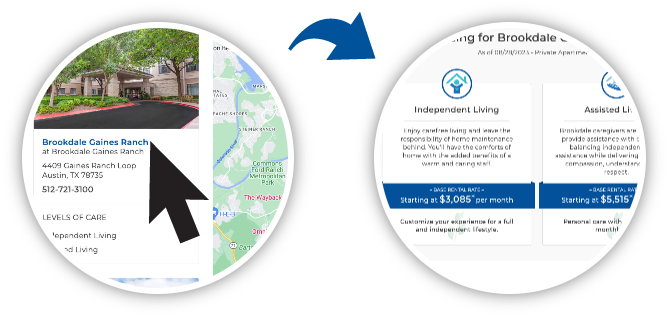- Home
- Brookdale Life
- Brookdale Blogs
- Three Common Dementia Symptoms
However, these behavioral expressions are actually symptoms of dementia. The actions make sense to the person with the disease. Understanding them can help you successfully respond and support the person.
Here are three examples:
Wandering
According to the Alzheimer’s Association, more than 60 percent of people with dementia will leave home and become lost at some point. Up to half will suffer serious injury or die if they aren’t found in 24 hours.
Wandering can stem from many different things. The person living with dementia may be restless or have a sense that there is a need to go somewhere (either realistically or unrealistically). If your loved one has pent-up energy due to lack of exercise or isn’t sleeping well at night because of daytime napping, there may be more physical restlessness at night.
Likewise, boredom may prompt the desire to leave in search of something more interesting, or the person may be acting on an old, recalled pattern of movement such as going home after work at 5 p.m. Ensuring exercise, limiting naps and providing meaningful things to do that meet current ability levels and interests can all combat this issue.
Issues with personal hygiene
Losing the ability to identify the meaning of objects, a symptom called agnosia,usually develops during dementia’s middle stage and can affect personal hygiene. If the brain can no longer tell the difference between the meaning of the couch, which is a place to sit and relax, and the meaning of the toilet, which is a place to sit and urinate, accidents can happen. Because this loss of meaning can apply to all things, the brain may no longer remember the important “not touch” lessons associated with excretions that we learn at a very early age and this can cause situations where maintaining cleanliness is more difficult.
Identifying whether your loved one uses a trigger phrase, such as “I want to go down the hall,” that really conveys the need to use the toilet can help. So can ensuring he or she visits the bathroom frequently, and making it easy to find by leaving the door open and light on when not in use. Recognize that adult briefs may be necessary and reassure your loved one that there is no need to be embarrassed by them. In fact, these products are now more discreet and comfortable.
Making off-color or profane comments
Dementia affects the frontal lobe of the brain, which is the area that controls inhibition, and the areas of the brain that control language. Both of these issues can lead a loved one to use inappropriate language when they are simply trying to express an unmet need. Maybe your loved one is trying to tell you they are in pain, need socialization or is asking for help with a task. If you take a closer look and identify what they are trying to tell you, you may be able to address their needs proactively and resolve this challenge.
Deciphering the reasons behind the behavioral expression can help greatly in preventing them in the future. However, don’t fault yourself if you still can’t read all the behaviors. Please take a realistic look at whether it remains practical for you to continue to meet your loved one’s needs at home. This is especially true if wandering is becoming a danger. If you are in this situation, I urge you to explore Brookdale’s Alzheimer’s and dementia care communities or other options in your area.
Categories
- Alzheimer's & Dementia
- Caregiver's Corner
- COVID-19
- Health, Safety and Wellness
- Financial Well-Being
- Passion & Purpose
- The Journey to Senior Living
- Trending Now
- Socialization & Relationships
- Brookdale Solutions
- Brookdale Vision and Growth
Archives
View All
- October 2025
- September 2025
- August 2025
- July 2025
- June 2025
- May 2025
- April 2025
- March 2025
- February 2025
- January 2025
- December 2024
- November 2024
X
Let us help find the right community for you!
Complete the form and a Senior Living Advisor will be in touch!
Inside Brookdale Communities
See what’s happening on our community Instagram pages
Brookdale has communities near you!



